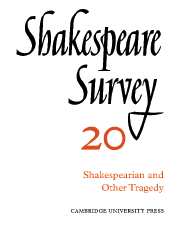Book contents
- Frontmatter
- Shakespeare, Fletcher and Baroque Tragedy
- Seneca and the Elizabethans: A Case-study in ‘Influence’
- George Chapman: Tragedy and the Providential View of History
- Critical Disagreement about Oedipus and Hamlet
- Shakespeare’s Thematic Modes of Speech: ‘Richard II’ to ‘Henry V’
- Anarchy and Order in ‘Richard III’ and ‘King John’
- The Staging of Parody and Parallels in ‘I Henry IV’
- Shakespeare’s Unnecessary Characters
- Walter Whiter’s Notes on Shakespeare
- Shakespeare’s ‘Romeo and Juliet’: Its Spanish Source
- The Grieves Shakespearian Scene Designs
- Shakespeare on the Modern Stage: Past Significance and Present Meaning
- Shakespeare in Brazil
- Recent Shakespeare Performances in Romania
- Shakespeare, the Twentieth Century and ‘Behaviourism’
- The Year's Contributions to Shakespearian Study 1 Critical Studies
- 2 Shakespeare’s Life, Times and Stage
- 3 Textual Studies
- Index
- Plate section
The Year's Contributions to Shakespearian Study 1 - Critical Studies
Published online by Cambridge University Press: 28 March 2007
- Frontmatter
- Shakespeare, Fletcher and Baroque Tragedy
- Seneca and the Elizabethans: A Case-study in ‘Influence’
- George Chapman: Tragedy and the Providential View of History
- Critical Disagreement about Oedipus and Hamlet
- Shakespeare’s Thematic Modes of Speech: ‘Richard II’ to ‘Henry V’
- Anarchy and Order in ‘Richard III’ and ‘King John’
- The Staging of Parody and Parallels in ‘I Henry IV’
- Shakespeare’s Unnecessary Characters
- Walter Whiter’s Notes on Shakespeare
- Shakespeare’s ‘Romeo and Juliet’: Its Spanish Source
- The Grieves Shakespearian Scene Designs
- Shakespeare on the Modern Stage: Past Significance and Present Meaning
- Shakespeare in Brazil
- Recent Shakespeare Performances in Romania
- Shakespeare, the Twentieth Century and ‘Behaviourism’
- The Year's Contributions to Shakespearian Study 1 Critical Studies
- 2 Shakespeare’s Life, Times and Stage
- 3 Textual Studies
- Index
- Plate section
Summary
While there is much in recent Shakespeare studies to suggest that the damaging division between ‘historical’ and ‘critical’ approaches is still being preserved, there are also some signs that a synthesis of these attitudes is being attempted; and many authors, while firmly bent on defining the totality of a play, or determining its special relevance to our age, nevertheless make skilful use of the ever-growing knowledge of the playwright’s own time. As one might expect, L. C. Knights in his Further Explorations has a good deal to say on the critical/historical dichotomy; and in one essay tackles the subject head-on. He restates his well-known position rather less stridently than in his earlier explorings:
The meanings of a poem are not exhausted by the meanings it may have had for its original readers . . . The meanings that it had for the original audience cannot in any case be identified with the meanings of which they were fully conscious.
and expresses his distrust of historical scholarship's tendency to 'substitute accumulated “knowledge about” for living responsiveness' thereby obscuring the essential nature of art and missing its 'personal vibrancy'. Knights is so attractively and seriously concerned with what is important in literature and life that it is difficult to take issue with him while reading his hard-thought-out articulations; and this is specially true when he admits the value of what scholarly research can supply in terms of such things as the habits of mind and ear of Renaissance man or the 'life-bearing ideas of Shakespeare's age'.
- Type
- Chapter
- Information
- Shakespeare Survey , pp. 143 - 160Publisher: Cambridge University PressPrint publication year: 1967



